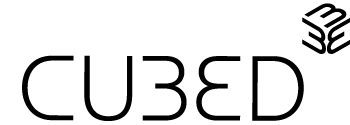MAKING AN IMPACT
We want to make a positive impact and we want to help others to do the same, whatever their role and the goals of their organisation.
We believe we can do that by creating opportunities for managers and leaders to develop soft skills and a mindset for creativity, ideas and innovation.
As part of our contribution to building a better society, economy and environment, we’ll offer FREE places places on our programmes for the leaders and managers of charities and social enterprises.
We’ll also prioritise programmes that align with clusters focused on developing projects and businesses whose specific purpose is sustainability; bringing together like-minded individuals from a variety of backgrounds and organisations.

REVERSE INNOVATION
Reverse innovation brings together large and mid-sized organisations with small, but growth-focused SMEs. It effectively puts a temporary management team around a business owner who has limited, if any, experience of working with a management team.
That might sound like the focus is entirely on the small business but that’s certainly not the case, with mutual benefit driving the agenda, rather than altruism and CSR.
Reverse innovation challenges those managers to solve their own challenges by applying a combination of their own experience, along with core innovation principles, in a completely new and unfamiliar context; learning more about their organisation by removing themselves from it.
HARD EVIDENCE FOR THE IMPACT OF SOFT SKILLS
A study carried out in 2016 with Indian garment workers showed that after taking part in a ‘soft skills’ focused personal advancement course the workers showed a 20% increase in productivity compared to the control group.
These workers were less likely to leave, were assigned more complicated tasks and were more likely to be promoted. They were also more likely to enrol in workplace skills development and incentive programmes.
There was also an increase in productivity in the workers surrounding the participants, implying their new energised mindsets were infectious.
Managers or leaders who can develop good interpersonal skills to communicate effectively, lead and persuade are becoming increasingly valuable assets for companies. This is especially true where roles are customer facing, working in and with teams and across disciplines.
“The cost of the programme paid for itself several times over”
WHAT ARE SOFT SKILLS
Sociologists have used the term soft skills to describe a person’s emotional intelligence quotient (EQ). Soft skills are personal character traits and interpersonal skills that enable individuals to interact effectively, accordingly and amicably with others.
In the year 2021, where survival of the fittest is the norm, hard, or functional, skills might be important BUT soft skills are imperative.
So it’s certainly worth considering how you support individuals to develop their soft skills.
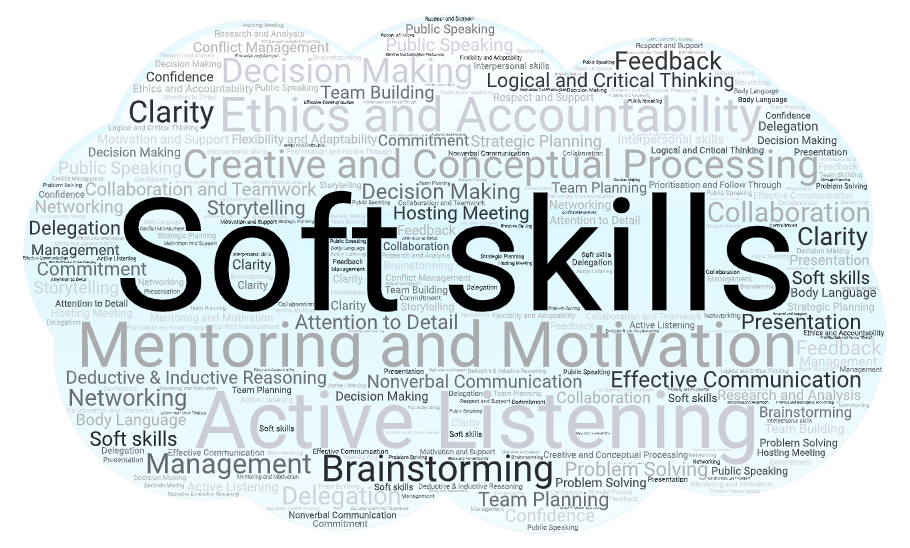

SOFT SKILLS OR POWER SKILLS?
If your perception is that soft skills can be hard to quantify, we’d suggest you think again. And you’d be in good company.
This article from Forbes references an internal study undertaken by Google that highlighted the contribution of soft skills to their highest performing teams.
As the article points out these skills are far from fluffy, nice-to-haves and should more correctly be referred to as ‘power skills’.

WHAT IS INNOVATION?
Actually, we’d love to find another word for innovation. A word that doesn’t come with all sorts of preconceptions that aren’t particularly useful.
It isn’t, or rather shouldn’t be, the remit of one specific department or team. But not everyone believes they have the either the permission or the creativity to have ideas. And that’s a shame.
As this article from Forbes puts it, ‘It is the group to whom you want to deliver a new, better way of doing things that holds the key to innovation’.
WHY MANAGERS NEED AN INNOVATION MINDSET
We’re all familiar with the sigmoid curve representing ‘lifecycles’ in business.
The challenge is to maintain the upward curve and avoid the (apparently inevitable) drop.
That’s why it’s critical to bridge both the ‘founder’s gap’ and the ‘midas gap’.
How? We’d suggest that helping your managers build the mindset for innovation is a pretty good place to start.
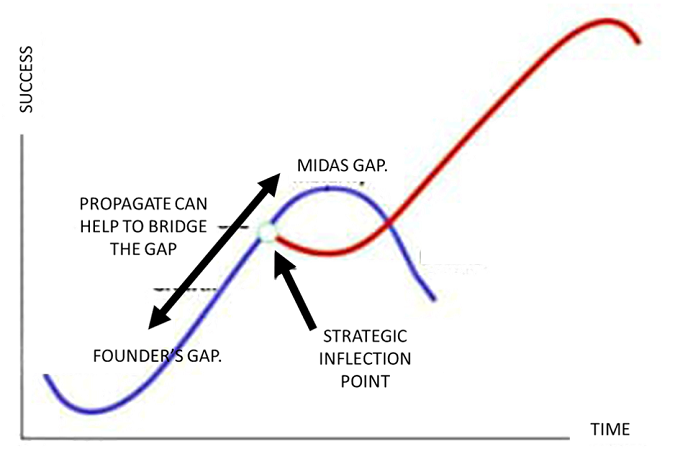
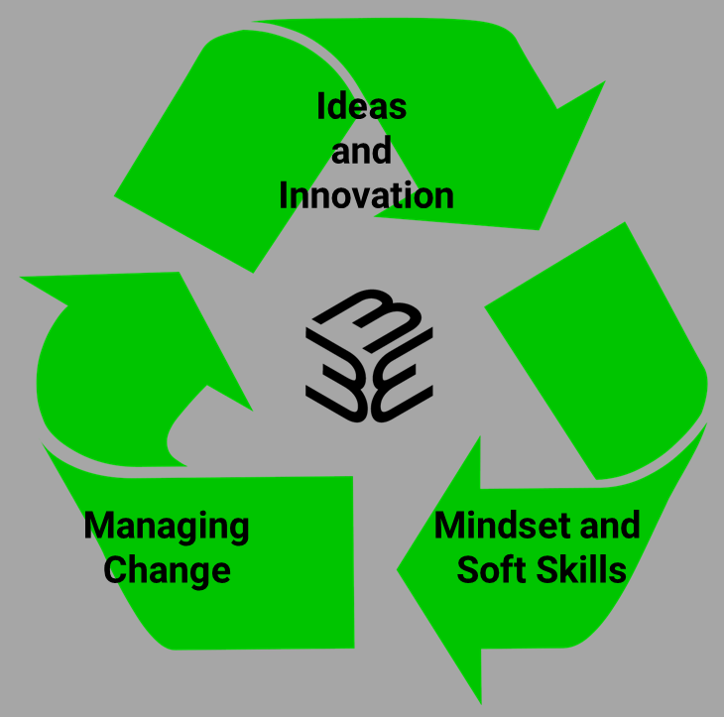
SUSTAINABILITY
When people talk about sustainability what do they really mean? According to one definition it’s ‘the quality of being able to continue over a period of time’.
At a very basic level it’s about survival but most of us strive for a little more.
The idea that businesses must not stand still is not new but given that change seems to be the new normal, that’s more important than ever.
Building the mindset required for generating ideas will also develop the skills and attitudes required to cope with and thrive through the changes those innovations bring about.
IMPROVING CAPACITY AND CAPABILITY
Let’s assume that a member of your team is working to around 75% of capacity. Achieving 100 requires an improvement of more than 30%. And sustaining that level longer term is probably unrealistic.
There is another way to reach the same level, if not exceed it. That’s by increasing their overall capability.
Apply the CUBED effect, by improving soft skills and capability around innovation, and the impact is even greater. (See the panel above about ‘HARD EVIDENCE FOR THE IMPACT OF SOFT SKILLS’)

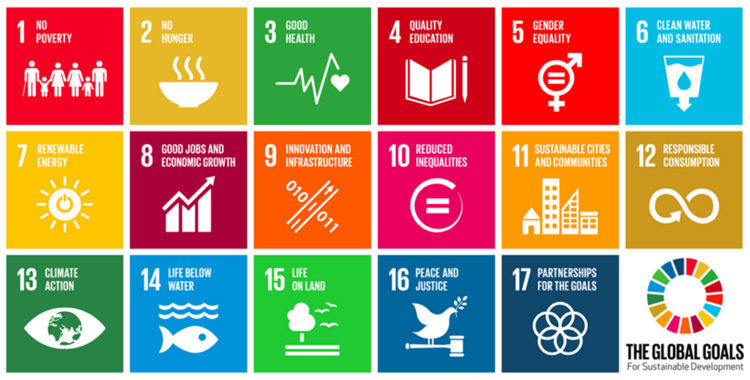
PURPOSE, PERSPECTIVE AND POSSIBILITY
Businesses are increasingly driven by the growing trend amongst consumers to make ‘value-based decisions’.
However, any claim of social purpose must be more than simply paying lip service and that will surely have a positive impact on the achievement of the UN’s Sustainable Development Goals.
A shift in culture seems inevitable, so again that has to bring focus on to soft skills, mindset and innovation.
